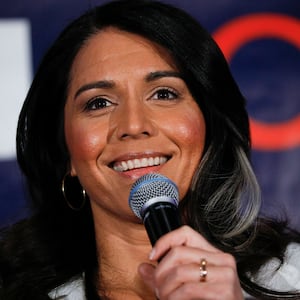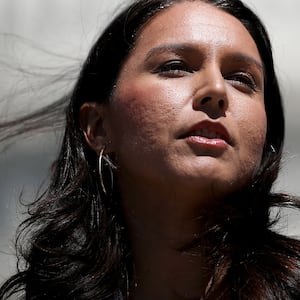Tulsi Gabbard, a former Democratic congresswoman from Hawaii and 2020 presidential dark horse candidate, has long perplexed U.S. officials and observers with her seemingly inexplicable pro-Russian positions. And a new development this week is sure to reinforce the half-jokes that Gabbard is a “Russian asset”; as it turns out, her campaign took money from one.
That agent—dual Russian-American national Elena Branson, also known as Elena Chernykh—stands accused of illegally pushing pro-Russia policies in the United States for nearly a decade, at the direction of top Kremlin officials, without registering under the Foreign Agents Registration Act (FARA), according to a criminal complaint federal prosecutors filed this week in the Southern District of New York.
But, in all her time lobbying for Russian goals, she gave money to just one federal candidate: Gabbard.
ADVERTISEMENT
According to Federal Election Commission records, an Elena Branson made two donations in 2019 to Gabbard’s presidential campaign. The filings tie the donation to Branson’s former address at a million-dollar condo on Central Park West. However, the merchant banker listed her occupation as “not employed.” (Branson lived in the United States for decades and holds American citizenship, so the contributions were legal.)
While the combined total of those donations isn’t colossal by any means—a whopping $59.95—they do raise questions about why an alleged Russian agent, tasked with currying favor with U.S. politicians, would zero in on Gabbard, and only Gabbard.
According to a Justice Department press release, Branson, who fled the United States last year and remains at large, had ties to top Kremlin brass, and “corresponded with Putin himself.”
“At the direction of the Russian government, she led a years long campaign to identify the next generation of American leaders, cultivate information channels, and shape US policy in favor of Russian objectives,” FBI Assistant Director-in-Charge Michael J. Driscoll said in the press release.
Of course, Gabbard is a longtime favorite of the Russian propaganda machine. She hired an alleged Russian agent on her campaign, and her Putin-backing has struck officials and political observers as well out of the norm for years—perhaps most famously her support for Russian intervention in Syria while defending dictator Bashar al-Assad.
That strange pattern continued even after Gabbard left office in 2021. This year, as Putin prepared to invade Ukraine, Gabbard parroted Russian talking points, urging the Biden Administration to guarantee that Ukraine will never join NATO—a longtime Kremlin demand.
Russia appears to have reciprocated. For instance, when Gabbard announced her 2020 aspirations, many of the sites that helped Russia interfere in the 2016 U.S. presidential elections came to her side. Her campaign also received thousands of dollars from a number of influential Russia backers in the United States.
The complaint against Branson, however, could offer another clue: The alleged spy conducted an off-the-books lobbying campaign targeting officials in Gabbard’s home state of Hawaii, regarding the name of a state park. That campaign ultimately yielded charges of conspiracy to act as an unregistered foreign agent against Branson.
According to an FBI agent’s sworn statements, the lobbying project involved communications with a member of Congress—an unidentified “Representative-1.”
At the time, the complaint said, Branson worked in concert with Russian diplomats to block a local proposal to change the name of “Russian Fort Elizabeth,” a 19th-century former Russian military installation on the island of Kauai.
Some residents and activists wanted to restore the fort’s Hawaiian name, a move that would literally wipe “Russia” off the map. But, according to the complaint, Branson spearheaded the Kremlin resistance, “by providing Hawaiian officials with messages from Russian officials and by organizing a trip for Hawaiian officials to Moscow to meet with high-ranking Russian Government personnel.”
The complaint said this violated federal lobbying laws, because Branson never registered with the Justice Department as an agent of the Russian government. She also never reported the work.
The FBI agent’s affidavit cites an email that Kauai County councilwoman Felicia Cowden forwarded to Branson in 2019, between Cowden and “an individual working in the office of a member of the United States House of Representatives (Representative-1).”
In the email, as quoted in the affidavit, Cowden asked the staffer whether the Representative would like to meet with “an extraordinary group of people regarding Russian diplomacy.” The email notified the staffer that the group would include Branson and “two diplomats from the Russian embassy in Washington DC,” the affidavit said.
That email was dated Feb. 7, 2019. Nine days later, Branson made her first donation to Gabbard, in the curious amount of $49.95.
It’s not clear whether Gabbard attended the meeting, or if she or her office had any direct contact with Branson or the Russians. However, a few months later, Branson organized a trip to Russia for a group of local Kauai officials, including Cowden, where they met with Kremlin officials.
The complaint includes photocopies of a thank-you card that Cowden allegedly sent Branson “for welcoming the people from Kauai.” The photocopies include a handwritten Post-it, on which Cowden wrote, “I am not coming or communicating because I am being watched. It feels wrong for me to be involved that way.” A second note on the back reads, “It is on the American side.”
The park’s name has not been changed, and is still a matter of contention.
Branson’s case isn’t entirely novel. Russia has long relied on its diaspora in the United States and around the globe to make connections and push for policies that favor Russia. Maria Butina was notoriously charged in 2018 for acting illegally as a Russian agent in the United States, after years of infiltrating influential GOP circles before and after the 2016 U.S. presidential election. In one case, Butina tried to arrange a meeting between then-candidate President Donald Trump and Russian President Vladimir Putin, prosecutors said.
A Gabbard spokesperson provided a statement that the former congresswoman did not know about Branson’s donations until The Daily Beast reached out.
“Congresswoman Gabbard’s campaign has received thousands of contributions over the years, so she was not aware of Branson’s miniscule contributions ($10 and $49.95) to Tulsi Now, nor is she aware of having any interaction with her,” the statement said. The spokesperson also claimed Gabbard was “not familiar with any park or fort or any other issues around this.” (The historic state park is located in Gabbard’s district, and at least one local activist group claims to have prepared a petition about the matter for Gabbard’s office.)
In light of the charges against Branson, Gabbard intends to donate the contributions to a charity, the spokesperson said.
“Despite the fact that Branson's contributions were miniscule, on principle, Branson's contributions will be donated to a charity that supports veterans, because it appears that Branson may be acting as an agent for a foreign country,” the spokesperson said, adding that the feds had not reached out to Gabbard’s team.
The spokesperson also claimed Gabbard was not Branson’s only target, asserting that Branson had contributed to a number of other Democratic candidates and committees as well. This, however, is not true, but a reference to a different Elena Branson, who lives in California and confirmed to The Daily Beast that those other donations were hers—and that she had not been served with a criminal complaint for acting as an unregistered agent of the Kremlin.








